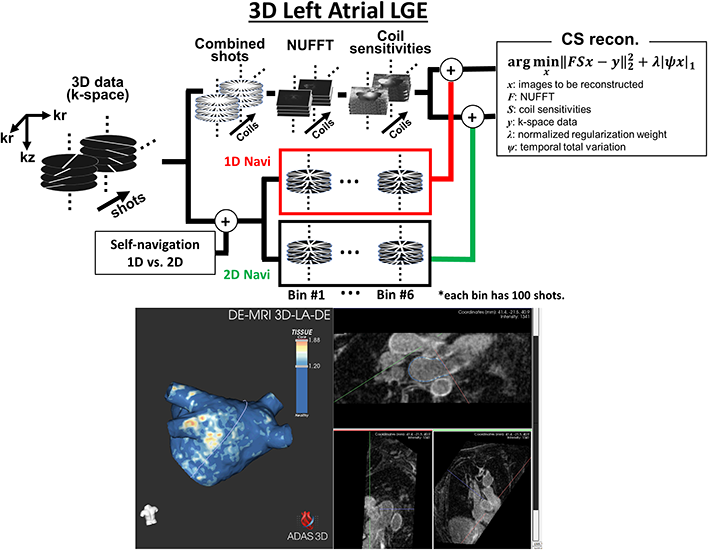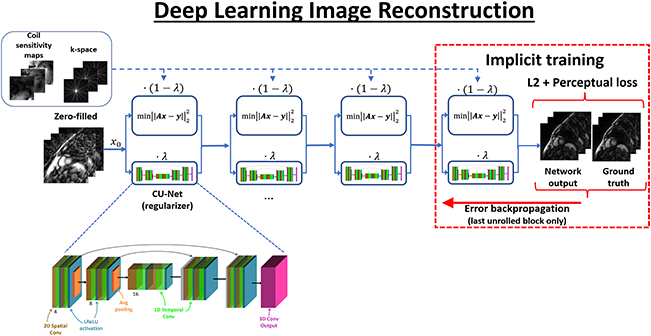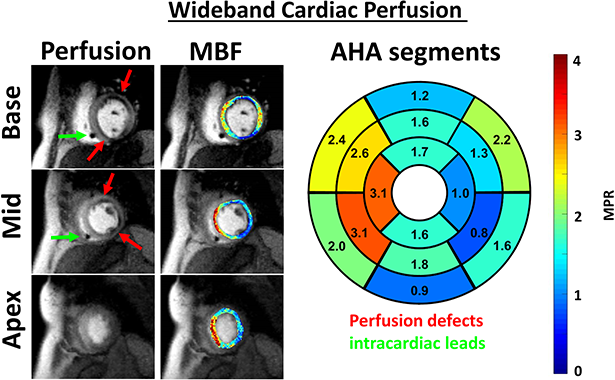Research
Learn more about the four major thrusts of the cardiovascular MRI laboratory led by Daniel Kim, PhD, and view our active funded studies. View recent publications here.
Cardiovascular MRI Research Areas
Pulse Sequence Programming
Our laboratory specializes in the development of advanced techniques for creating rapid, free-breathing 3D cardiac MRI pulse sequences. These sequences encompass a range of applications, including late gadolinium enhancement (LGE), perfusion studies and cine imaging. Our research focuses on several key areas, including pulse sequence programming, k-space trajectory optimization, iterative image reconstruction and advanced signal processing. View an illustrative example of this work below.
We also offer students both theoretical (MR physics and k-space formalism) and hands-on training (implementation on MRI scanners) to develop novel MRI acquisition methods and test their performance on phantoms and human subjects. If you're interested in training with the Daniel Kim Lab, contact us.

Image Reconstruction
Our team leverages state-of-the-art deep learning networks to tackle the challenging task of solving the inverse problem in image reconstruction, particularly when dealing with highly undersampled k-space data (see visualization below). Our research in this area encompasses a range of topics, including supervised and unsupervised models as well as both linear and nonlinear models. To facilitate our research efforts, our lab maintains an extensive repository of undersampled multi-dimensional raw k-space data. This data serves as a valuable resource for developing and rigorously testing our deep learning models
Students in our lab will receive both theoretical (image formation principles, signal processing and deep learning) and hands-on training (implementation on GPU workstations and MRI image reconstruction pipeline) to develop novel MRI reconstruction methods and test their performance with respect to data fidelity and reconstruction speed. Contact us to inquire about open training positions in the lab.

Image Processing & Mathematical Modeling
Students in our lab will receive both theoretical and hands-on training to process images and convert MRI signal into clinically relevant parameters. Specific techniques include motion extraction and correction, artifact suppression, automated segmentation, data compression and mathematical modeling of MR spin physics and compartmental models. Contact us about training in the lab.
Clinical Translation
In our laboratory, we harness cutting-edge wideband technology to conduct highly effective cardiac MRI examinations in patients with cardiac implantable electronic devices (CIEDs). These advanced techniques are adept at mitigating the imaging artifacts commonly associated with CIEDs. View an illustrative example of this work below.
We maintain a robust collaboration with our clinical Cardiology and Radiology colleagues, working closely together to facilitate the seamless translation of this technology into routine clinical practice.
Students training with us will receive valuable experience translating new MRI technologies into clinical routine. This will be done in collaboration with clinical radiologists in specific areas where new technologies outperform standard clinical MRI routines. Contact us about training opportunities.

Active Funded Studies
RSNA (EILTC2302)
"Discovery of Racial Disparities in Coronary Microvascular Dysfunction in Long COVID Patients using Rapid Quantitative Cardiovascular MRI"
Principal Investigators: Daniel Kim, PhD, and Daniel Lee, MD
Project period: 06/15/23-06/14/24
"Quantitative Detection of Coronary Microvascular Dysfunction in Long COVID Patients using a Comprehensive, Rapid, Free-Breathing Cardiovascular MRI"
Principal Investigators: Daniel Kim, PhD, and Daniel Lee, MD
Project period: 04/15/23-03/31/27
American Heart Association (23PRE1027440)
"Real-time Exercise Cardiac Magnetic Resonance Imaging for Assessment of Mitral Regurgitation"
Principal Investigator: Huili Yang
Project period: 01/01/23-12/31/24
American Heart Association (949899)
"Rapid Cardiovascular MRI for Quantifying Coronary Microvascular Dysfunction in COVID-19 Survivors"
Principal Investigators: Daniel Kim, PhD, and Daniel Lee, MD
Project period: 04/01/22-03/31/25
NIH/NHLBI (1K99HL161469-01)
"Non-contrast 3D T1p Mapping for Myocardial Fibrosis Quantification of Pediatric Cardiomyopathy Patients"
Principal Investigator: Suvai Gunasekaran, PhD
Project period: 03/01/22-02/29/24
NIH/NIBIB (R21 EB030806-01A1)
"Next-Generation Cardiovascular MRI powered by Artificial Intelligence"
Principal Investigators: Daniel Kim, PhD, and Aggelos Katsaggelos, PhD
Project period: 04/15/21-01/31/23
NUCATS
"MRI of Chronic Heart Injury Associated with COVID-19"
Principal Investigators: Daniel Kim, PhD, and Daniel Lee, MD
Project period: 03/01/21-04/01/24
NIH/NHLBI (R01 HL116895-06)
"Precision MRI of Left Atrial Fibrosis for Patients with Atrial Fibrillation"
Principal Investigator: Daniel Kim, PhD
Project period: 03/10/21-02/28/26
NIH/NHLBI (R01HL151079)
"Real-time Wideband Cardiac MRI for Patients with a Cardiac Implantable Electronic Device"
Principal Investigators: Daniel Kim, PhD, and Daniel Lee, MD
Project period: 03/04/20-12/31/23